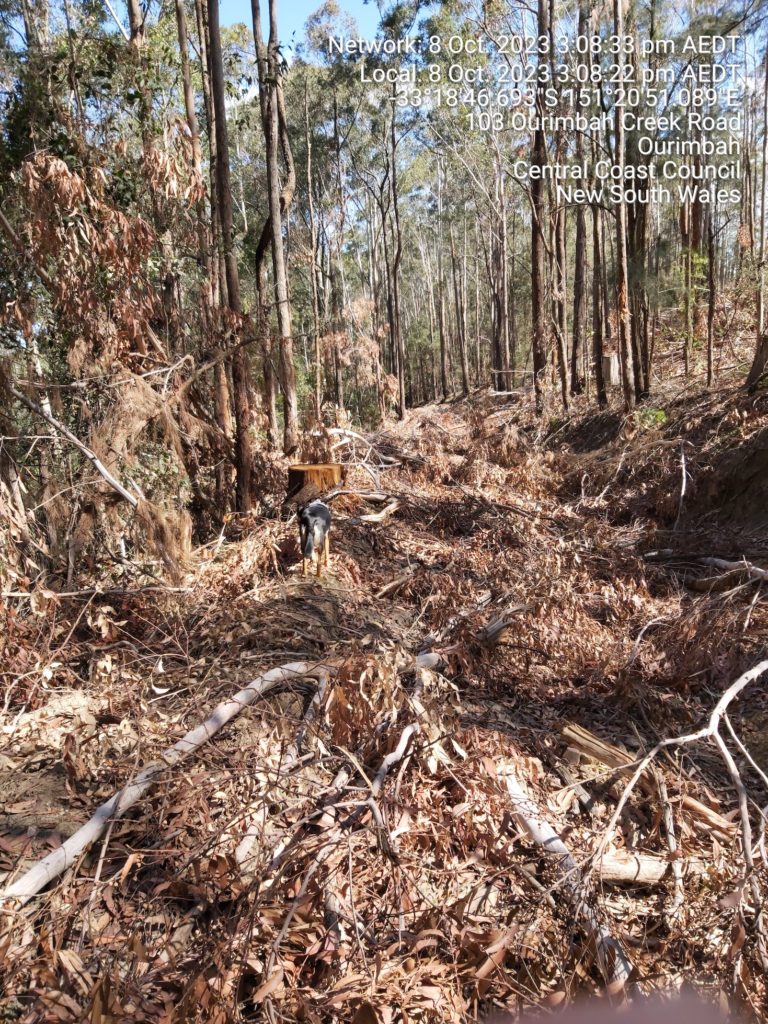Community group Camp Ourimbah has accused Forestry Corporation NSW (FCNSW) of a lack of truth, transparency and respect shown to the community over the controversial logging of Ourimbah State Forest (OSF).
Founder Ursula Da Silva said the community had campaigned for almost three years against logging in the native forest characterised by old growth rainforest remnants, sandstone rocky outcrops, shaded tributaries and riparian habitat.
“There is a lot of glossy misinformation in (statements made) by Forestry Corporation in a Coast Community News article on October 26,” she said.
“I don’t believe FCNSW will be replanting the recently logged 300 acres of forest as the areas they logged in 2020 were not replanted and now have lantana growing in them.
“Instead, their logging compartments have been left as a giant fire hazard for the Central Coast strewn with discarded logging debris.”
Resident Brian Davies, who was actively campaigning against logging behind his property along Toobys Creek in 2003, said FCNSW certainly did not engage in any replanting.
“There are supposed to be rules to mitigate damage but no-one seemed to check,” he said.
“The roads along the creek banks were graded and dirt pushed over the edge into the creek.
“Log dumps were built close to the creek and gullies that feed it.
“Prior to logging we used to walk along the banks of the creek on a regular basis as it was a beautiful rainforest walk.
“We were appalled by what happened during logging.”
Another resident active in the campaign, Deb Chu, said Canada Drop Down Creek and Ourimbah Creek have already been damaged by logging activities.
“These creeks are known habitat for platypus, and Canada Drop Down Creek is also mapped Key Fish Habitat,” she said.
“It is of sufficient complexity to support endangered ecological communities.
“Unfortunately, the anti-siltation runoff measures employed by FCNSW are inadequate.
“Soil runoff is already evident after the relatively mild rainfall on the Central Coast in the past few weeks.”
She said it was difficult to see how assertions that recently logged areas functioned as escape ‘corridors’ for wildlife, and staging areas for firefighting in the event of summer bushfires would work.
“In Ourimbah State Forest many of the potential ‘staging areas’ and harvested ‘corridors’ contain enormous amounts of logging debris,” she said.
“Large thick piles of bark are pushed into ‘windrows’ skirting the ‘staging areas’ right on the edge of the surviving forest.
“Huge mounds of tree debris, including large tree trunks and branches, are also pushed up against the forest edge.
“Former fire trails have been blocked with felled tree debris.”
Ecologist Sally Alldis said claims that logged areas also served as refuges and exit points for wildlife during bushfires were misleading.
“Wildlife are more prone to take refuge in adjacent areas of rainforest, riparian or wet sclerophyll vegetation than they are in open disturbed areas that offer no standing habitat with limited food or water sources available,” she said.
“Additionally the forest was not burnt in the 2019-2020 fires and is therefore a vital habitat refuge within the greater landscape.
“To continue to log Ourimbah State Forest is to diminish quality habitat for wildlife during the recovery of other areas.”

Camp Ourimbah says recent logging operations have left the forest with an intensified risk of fire, with Professor David Lindenmayer from the Australian National University saying forests are more flammable for up to 70 years after they are logged.
“The logging aftermath of FCNSW’s July-August harvest this year and from past years has added to Ourimbah forest’s fuel burden,” resident Deb Chu said.
“The areas that were logged in the forest in 2020 still have large debris piles waiting to be burnt.”
A request that this logging debris be immediately converted to mulch in order to mitigate the current fire risk has been lodged with FCNSW by Camp Ourimbah to no avail.
“If you wish to participate in the solution to a catastrophic bushfire please go online and fill in a form on the Rural Fire Service’s website,” Da Silva said.
“It is a public hazard form and the area of concern is Middle Ridge Rd, Ourimbah State Forest.”
She said the industrial-style modern logging practice of harvesting about every 20 years prevented trees from growing to the true maturity needed for a balanced and thriving forest ecosystem.
“Logging over time reshapes the ecology of native forests such as our Ourimbah State Forest,” she said.
“Instead of logging the forest for wood chips at taxpayers’ expense, we could conserve our forest for ecotourism, cultural heritage and conservation, meaning more jobs, a healthy, thriving forest ecology and community and a safer future.”


